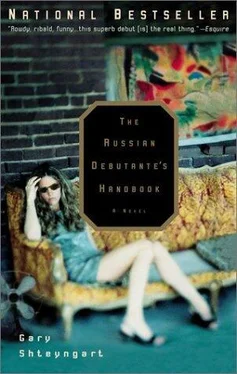Gary Shteyngart - The Russian Debutante's Handbook
Здесь есть возможность читать онлайн «Gary Shteyngart - The Russian Debutante's Handbook» весь текст электронной книги совершенно бесплатно (целиком полную версию без сокращений). В некоторых случаях можно слушать аудио, скачать через торрент в формате fb2 и присутствует краткое содержание. Город: New York, Год выпуска: 2003, ISBN: 2003, Издательство: Riverhead Books, Жанр: Современная проза, Юмористическая проза, на английском языке. Описание произведения, (предисловие) а так же отзывы посетителей доступны на портале библиотеки ЛибКат.
- Название:The Russian Debutante's Handbook
- Автор:
- Издательство:Riverhead Books
- Жанр:
- Год:2003
- Город:New York
- ISBN:0-7865-4177-6
- Рейтинг книги:4 / 5. Голосов: 1
-
Избранное:Добавить в избранное
- Отзывы:
-
Ваша оценка:
- 80
- 1
- 2
- 3
- 4
- 5
The Russian Debutante's Handbook: краткое содержание, описание и аннотация
Предлагаем к чтению аннотацию, описание, краткое содержание или предисловие (зависит от того, что написал сам автор книги «The Russian Debutante's Handbook»). Если вы не нашли необходимую информацию о книге — напишите в комментариях, мы постараемся отыскать её.
and
. The Russian Debutante’s Handbook Bursting with wit, humor, and rare insight,
is both a highly imaginative romp and a serious exploration of what it means to be an immigrant in America.
The Russian Debutante's Handbook — читать онлайн бесплатно полную книгу (весь текст) целиком
Ниже представлен текст книги, разбитый по страницам. Система сохранения места последней прочитанной страницы, позволяет с удобством читать онлайн бесплатно книгу «The Russian Debutante's Handbook», без необходимости каждый раз заново искать на чём Вы остановились. Поставьте закладку, и сможете в любой момент перейти на страницу, на которой закончили чтение.
Интервал:
Закладка:
“You live on the Upper East Side…?” Vladimir babbled. “A penthouse? On Social Security? But how can it be?” He had the dizzy impression that the room had begun to sway. The only enjoyment Vladimir derived from his job was encountering foreigners even more flummoxed by American society than he was. But today this simple pleasure was proving highly elusive. “Where did you get the money?” Vladimir demanded of his client. “Who bought you this zero refrigerator?”
The Fan Man reached over and pinched Vladimir’s nose between thumb and forefinger, a familiar Russian gesture reserved for small children. “I’m psychotic,” the Fan Man explained. “But I’m no idiot.”
2. YELENA PETROVNA, HIS MOTHER
ON THIS MONDAYmorning, like all Monday mornings, the Emma Lazarus Society experienced a state of misdirected frenzy. Lonely social workers were opening up their hearts to one another; the agency’s Acculturation Czar, a homesick, suicidal Pole, was bellowing through his introductory course on America (“Selfish People, Selfish Land”); and the weekly immigrants’ pet show was underway in the International Lounge, a Bengali turtle leading the pack this time.
Surrounded by such polyglot commotion, it was easy for Vladimir to abandon his post—the so-called Russia Desk, covered with bureaucratic ink stains and newspaper clippings about Soviet Jews in distress. But before Vladimir could accompany Mr. Rybakov to his penthouse, an impassioned well-wisher rang him at the office.
“DEAREST VOLODECHKA! ”Mother shouted. “Happy birthday…! Happy new beginning…! Your father and I wish you a brilliant future…! Much success…! You’re a talented young man…! The economy’s improving…! We gave you all our love as a child…! Everything we had, to the very last…!”
Vladimir turned down the volume on the headset. He knew what was coming, and, indeed, seven exclamation marks down the road, Mother broke down and started wailing God’s name in the possessive: “Bozhe moi! Bozhe moi!”
“Why did I get you that job, Vladimir?” she cried. “What was I thinking? You promised me you would stay no more than one summer—it’s been four years! I’ve stagnated my own son, my one and only. Oh, how did this transpire? We brought you to this country, and for what? Even the stupid native-born do better than you…”
On and on she went, through a barrage of tears, gurgling and explosive nasal contretemps, about the joys of going to college and then law school, the lack of status in being a desk slave for a nonprofit agency, working for eight dollars an hour while his contemporaries were going full steam ahead with their professional educations. Gradually, her soft, steady wail increased in tempo and pitch, until she reminded Vladimir of a devout woman at a Middle Eastern funeral the moment her son’s coffin is lowered into the ground.
Vladimir sat back and sighed loudly in protest. She couldn’t stop, not even on his birthday.
It had taken his own father a year of courtship and a decade of marriage to adapt to Mother’s talent of bawling at will. “Don’t cry. Oh, why are you crying, little porcupine?” the young Dr. Girshkin would whisper to his wife in their dim Leningrad apartment as he ran his hands through her hair, hair darker than the exhaust hanging over the city, hair which even strong Western hair-curlers could not curl (they called her Mongolka, and she was, indeed, one-eighth Mongolian). Intermittent flashes of neon would illuminate the tears descending her oblong face as the meat-store sign positioned directly below their flat struggled to keep alight in the erratic power grid. He would never forgive her for not responding to his caresses until late into the night, when she fell asleep and instinctively curled into his shoulder, long after somebody had mercifully put out the MEAT sign and the streets surrendered to the foggy and indiscernible Petersburg darkness.
Vladimir, as well, suffered under his mother’s accusative wails as B-plus report cards were ceremonially burned in the fireplace; as china was sent flying for chess-club prizes not won; as he once caught her in her study sobbing at three in the morning, cradling a photo of the three-year-old Vladimir playing with a toy abacus, so bright-eyed, so enterprising, so full of hope…But the coup de grace took place during the wedding of a California Girshkin when Mother publicly broke down and accused Vladimir—shyly disco-dancing with a fat cousin—of having “the hips of a homosexual.” Oh, those sensuous hips!
Guilt-ridden and confused, Vladimir looked to his father for reinforcement, or at least an explanation, but one was not forthcoming until his early teens, when his father took him on a long autumn walk through swampy, gaseous Alley Pond Park—Queens’ gift to the nation’s forests—allowing his mouth to expel the word “divorce” for the first of many times.
“Your mother suffers from a kind of madness,” he had said. “In a very real and medical way.”
And Vladimir, young and tiny but already a child of America, said, “Aren’t there pills she can take?” But the holistic-minded Dr. Girshkin did not believe in pills. A strenuous alcohol rubdown and a hot banya were his universal prescriptions.
Even now, when Vladimir felt more detached from her sobs than ever, he remained at a loss for what to say in order to bring them to an end. His father had never figured it out either. Nor did he ever gather the courage to go through with his meticulously planned divorce. Mother was, for all her faults, his sole friend and confidante in the New World.
“ Bozhe moi, Vladimir,” wept Vladimir’s mother, and then she stopped abruptly. She did something with the phone: it beeped. For a moment there was nothing. “I’m putting you on hold, Vladimir,” she said finally. “There’s a call from Singapore. It could be important.”
An instrumental version of “Michael, Row Your Boat Ashore” blared from the electronic bowels of Mother’s corporation and into Vladimir’s ear.
It was time to go. Mr. Rybakov, left unattended, had stumbled back into the reception room and was terrorizing the security guard once more. Vladimir was close to hanging up when Mother returned with a whimper. Vladimir cut her off: “So how are things with you?”
“Terrible,” said Mother, switching to English, which meant job-talk. She blew her nose. “I have to fire someone in office.”
“Good for you,” Vladimir said.
“Is big complication,” groaned Mother. “He is American African. I am nervous I will say something wrong. My English not so good. You must teach me to be sensitive to Africans this weekend. It is important skill, no?”
“I’m coming over this weekend?” said Vladimir.
His mother made an effort to laugh and told him how insane it would be not to have a birthday barbecue. “You’re only twenty-five once,” she said. “And you are not a—How you say? A complete loss.”
“I’m not on crack, for one thing,” Vladimir volunteered cheerfully.
“And you’re not homo,” said his mother. “Hmm?”
“Why do you always—”
“Still with Jewish girl. Little Challah-bread.”
“Yes,” Vladimir reassured her. Yes, yes, yes.
Mother exhaled deeply. “Well, that’s good,” she said. She told him to bring his swimming trunks on Saturday because the pool might be fixed by then. She managed to both sigh and kiss Vladimir good-bye at the same time. “Be strong,” was her last, enigmatic bit of advice.
THE LOBBY OFMr. Rybakov’s building, the Dorchester Towers, was centered around a tapestry depicting the Dorchester coat of arms, a double-headed eagle clutching a scroll in one beak and a dagger in the other—the graphic story of New Money and how it got that way. Two doormen opened the door for Vladimir and his client. A third one gave Vladimir a piece of candy.
Читать дальшеИнтервал:
Закладка:
Похожие книги на «The Russian Debutante's Handbook»
Представляем Вашему вниманию похожие книги на «The Russian Debutante's Handbook» списком для выбора. Мы отобрали схожую по названию и смыслу литературу в надежде предоставить читателям больше вариантов отыскать новые, интересные, ещё непрочитанные произведения.
Обсуждение, отзывы о книге «The Russian Debutante's Handbook» и просто собственные мнения читателей. Оставьте ваши комментарии, напишите, что Вы думаете о произведении, его смысле или главных героях. Укажите что конкретно понравилось, а что нет, и почему Вы так считаете.












